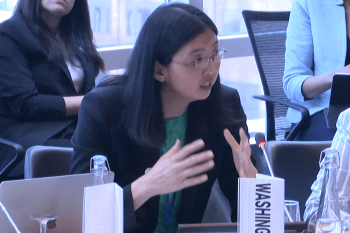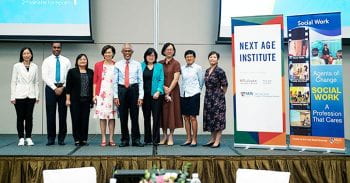Huseynli, A. (2023). Social work in Azerbaijan: Achievements and challenges of the profession. International Social Work, 66(5), 1527–1541. https://doi.org/10.1177/00208728221075824
Tag: 2022
Zou talks global CDAs at World Bank Evolution Forum

Li Zou has given many presentations on Child Development Accounts (CDAs) in other countries, but this one was different.
The international director for the Center for Social Development (CSD) was at the World Bank to deliver invited remarks on the bank’s plan to evolve its mission and operations. The bank’s roadmap affirms commitments to poverty reduction and shared prosperity while calling for changes to better meet global challenges.
At the bank’s April 11 Evolution Forum, Zou sketched a strategy for meeting all three of those goals, a strategy for developing a global CDA policy based on research by the Center for Social Development.
Social Work Education in Post-Soviet Countries: Progress of Azerbaijan
Huseynli, A. (2022). Social work education in post-Soviet countries: Progress of Azerbaijan. British Journal of Social Work, 53(5), 2560–2580. https://doi.org/10.1093/bjsw/bcac225
Special issue offers new insights on family financial well-being

A special issue of the Journal of Family and Economic Issues charts an agenda for new practice and research on financial capability, assets, and family financial well-being.
New pilot tests CDAs, supports for families of children with autism

In China, CSD’s new research with Child Development Accounts aims to build families’ capacity for managing autism and its costs.
Global Child Development Accounts: A “Moon Shot” to Develop Every Child and the Planet
Sherraden, M., & Zou, L. (2022, October). Global Child Development Accounts: A “moon shot” to develop every child and the planet (CSD Perspective No. 22-27). Washington University, Center for Social Development. https://doi.org/10.7936/s6qa-9q90
Asset Building Among U.S. Lawful Permanent Residents: The Role of Initial Legal Status
Zeng, Y. (2022). Asset building among U.S. lawful permanent residents: The role of initial legal status. Journal of Immigrant & Refugee Studies. Advance online publication. https://doi.org/10.1080/15562948.2022.2128497
Building Financial Capability Among Low-Income Older Asian Immigrants: The Roles of Financial Access and Locus of Control
Nam, Y., Sherraden, M. S., Lee, E. J., & Huang, J. (2022). Building financial capability among low-income older Asian immigrants: The roles of financial access and locus of control. Journal of Consumer Affairs, 56(4), 1683-1704. https://doi.org/10.1111/joca.12486
Effective Finance to Increase Financial Well-Being for Low-Income Families: Empirical Examination and Policy Implications
Huang, J., Sherraden, M., Sherraden, M. S., & Johnson, L. (2022). Effective finance to increase financial well-being for low-income families: Empirical examination and policy implications. Journal of Consumer Affairs, 56(4), 1638–1657. http://doi.org/10.1111/joca.12484
Innovative training for Singapore’s frontline staff and volunteers

In Singapore, an innovative project is training frontline staff and volunteers to give financial guidance to low-income families.
California launches nation’s largest Child Development Account policy

The state enrolls 3.4 million children in CalKIDs, which CSD experts helped to shape. Today Governor Gavin Newsom publicly launched CalKIDS, the California Kids Investment and Development Savings program. With 3.4 million children in the first cohort of enrollees and more than $1.8 billion in assets, CalKIDS leaves the starting gate as the nation’s largest […]
Social Workers Can Help Adults With Complex Needs With Financial Wellbeing
Fang, S., & Huang, J. (2022). Social workers can help adults with complex needs with financial wellbeing. BMJ, 378, Article 1928. http://dx.doi.org/10.1136/bmj.o1928
Audience of over 2.65 million for keynotes on financial social work

On June 29, Faculty Directors Jin Huang and Minchao Jin delivered keynote addresses at the 2022 Financial Literacy Education Forum in mainland China. Carried by state news agency Xinhua, Sina Weibo, Youku, and numerous other platforms, the event drew an audience of over 2.65 million viewers.
Worldwide, over 15 million have Child Development Accounts

New estimates on the number of children around the globe who are building assets in CDAs. Over 15 million children have built assets in Child Development Accounts (CDAs), according to new estimates in a brief by Li Zou and Michael Sherraden with the Center for Social Development in the Brown School at Washington University. Zou […]
Child Development Accounts Reach Over 15 Million Globally
Zou, L., & Sherraden, M. (2022, June). Child Development Accounts reach over 15 million children globally (CSD Policy Brief No. 22-22). Washington University, Center for Social Development. https://doi.org/10.7936/yfyb-r646
Bank Compliance With National Transaction Account Standards: Evidence From a Mid‐Western Metropolitan Area
Birkenmaier, J., Huang, J., & Balu, A. (2022). Bank compliance with national transaction account standards: Evidence from a mid‐western metropolitan area. Journal of Consumer Affairs, 56(2), 982–1003. https://doi.org/10.1111/joca.12428
Child Development Accounts expand resources for higher education

New research from the Center for Social Development shows that a children’s account policy reduces obstacles to higher education. As the cost of higher education continues to grow, families in the United States struggle to save enough for children’s education. State 529 college savings plans are investment vehicles that assist families in meeting this need, […]
Climate Change, Social Work, and the Transition Away From Fossil Fuels: A Scoping Review
Mason, L. R., Melton, C. C., Gray, D., & Swallow, A. L. (2022). Climate change, social work, and the transition away from fossil fuels: A scoping review. Sustainability, 14(12), Article 7086. https://doi.org/10.3390/su14127086
Financial Facts: SEED OK Child Development Accounts at Age 14
Clancy, M. M., Beverly, S. G., Schreiner, M., Huang, J., & Sherraden, M. (2022, June). Financial facts: SEED OK Child Development Accounts at age 14 (CSD Fact Sheet No. 22-20). Washington University, Center for Social Development. https://doi.org/10.7936/13ge-kt42
Senator, national experts discuss strategies for economic security

Policies to strengthen vulnerable families typically focus either on boosting income for present needs or assets for future priorities. A recent event spotlighted policies to integrate the two approaches for vulnerable families – as we already do for other families.
Economic Security From an Asset Perspective
Elliott, W., III. (2022, May). Economic security from an asset perspective (CSD Perspective No. 22-19). Washington University, Center for Social Development, and University of Michigan, Center on Assets Education, and Inclusion.
Reducing Extreme Economic Inequality
Henly, J., Lein, L., Romich, J., Shanks, T. R., & Sherraden, M. S. (with Jones, R., & Tillotson, A.). (2022). Reducing extreme economic inequality. In R. P. Barth, J. T. Messing, T. R. Shanks, & J. H. Williams (Eds.), Grand challenges for social work and society (2nd ed., pp. 279–309). Oxford University Press.
Building Financial Capability and Assets for All
Huang, J., Sherraden, M. S., Johnson, E., Birkenmaier, J., Rothwell, D., Despard, M. R., Jones, J. L., Callahan, C., Doran, J., Frey, J. J., McClendon, G. G., Friedline, T., & McKinney, R. (2022). Building financial capability and assets for all. In R. P. Barth, J. T. Messing, T. R. Shanks, & J. H. Williams (Eds.), Grand challenges for social work and society (2nd ed., pp. 310–340). Oxford University Press.
Conclusions and Looking Forward
Barth, R. P., Silk, K., Flynn, M. L., Uehara, E. Messing, J. T., Shanks, T. R., Sherraden, M., & Williams, J. H., (2022). Conclusions and looking forward. In R. P. Barth, J. T. Messing, T. R. Shanks, & J. H. Williams (Eds.), Grand challenges for social work and society (2nd ed., pp. 389–405). Oxford University Press.
Commentary
Johnson, L., Butts, S. C., Manderscheid, R., Sherraden, M., & Lewis, C. E. (2022). Commentary. In R. P. Barth, J. T. Messing, T. R. Shanks, & J. H. Williams. J. H. (Eds.), Grand challenges for social work and society (2nd ed., pp. 406–414). Oxford University Press.
CSD events spotlight ‘threats to democracy,’ work to protect voting

Two recent events illuminated restrictions on ballot access and strategies to increase voting. Both featured national experts on voting rights.
Policy Mapping of US Congressional Proposals on Climate Change: Informing Social Work Advocacy
Mason, L. R., Minnick, D. J., Tercero, S., Cummings Melton, C., & Greenfield, J. C. (2022). Policy mapping of US congressional proposals on climate change: Informing social work advocacy. Journal of Policy Practice and Research, 3, 221–240. https://doi.org/10.1007/s42972-022-00055-4
Financial Capability
Sherraden, M. S., Huang, J., & Ansong, D. (2022, February 24). Financial capability. In C. Franklin (Ed.), Encyclopedia of Social Work (Online ed.). https://doi.org/10.1093/acrefore/9780199975839.013.1201
Grand Challenges for Social Work
Flynn, M. L., Barth, R. P., Uehara, E., & Sherraden, M. (2022, February 24). Grand Challenges for Social Work. In C. Franklin (Ed.), Encyclopedia of Social Work (Online ed.). https://doi.org/10.1093/acrefore/9780199975839.013.1458
CSD launching ‘Empowering Voting and Democracy’ series

Events to feature Barbara Arnwine, national voting rights experts, and elections officials As the United States prepares for the 2022 elections, voting rights are under threat. What can be done to protect access to the ballot? Civil rights leader Barbara Arnwine of the Transformative Justice Coalition, Elizabeth Hira of the Brennan Center for Justice and […]
Introducing the Disease Outbreak Resilience Index (DORI) Using the Demographic and Health Surveys Data from sub‑Saharan Africa
Koomson, I., Okumu, M., & Ansong, D. (2022). Introducing the Disease Outbreak Resilience Index (DORI) Using the Demographic and Health Surveys data from sub‑Saharan Africa. Social Indicators Research, 162, 1149–1175. https://doi.org/10.1007/s11205-022-02881-1
Financial Capability and Asset Building in Social Work Practice
Sherraden, M. (2022, January). Financial capability and asset building in social work practice (CSD Perspective No. 22-01). Washington University, Center for Social Development. https://doi.org/10.7936/a6jt-bb86
Preparing Social Workers to Improve People’s Finances
Sherraden, M. S. (2022, January). Preparing social workers to improve people’s finances (CSD Perspective No. 22-02). Washington University, Center for Social Development. https://doi.org/10.7936/w45g-2b72
A Policy Mapping Analysis of Goals Related to Bank Accounts in Federal Legislative Proposals
Birkenmaier, J. M. & Janssen, A. (2021). A policy mapping analysis of goals related to bank accounts in federal legislative proposals. Journal of Policy Practice and Research, 3, 96–117. https://doi.org/10.1007/s42972-021-00037-y